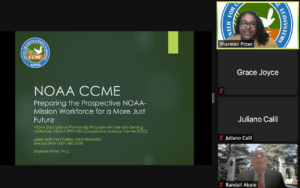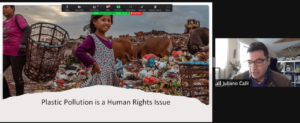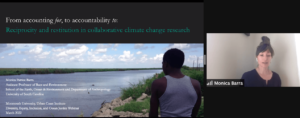By Grace Joyce
On March 9, 2022, the Institute for Global Understanding and the Urban Coast Institute co-hosted the virtual panel discussion, “Diversity, Equity, Inclusion, and Ocean Justice.” The event was this year’s first installment of the Global Ocean Governance Lecture Series, which consists of experts discussing legal, scientific, and policy issues that impact coastal and marine ecosystems. Moderated by IGU Director Prof. Randall Abate, the panel consisted of three speakers who opened a discussion on what ocean justice is and how it can be pursued in diversity, equity, and inclusion initiatives in higher education and in contexts such as marine plastics and coastal wetlands restoration.

The first panelist was Dr. Sharmini Pitter, the assistant director of the NOAA Center for Coastal and Marine Ecosystems (NOAA CCME). Dr. Pitter emphasized the importance of education and training in spreading awareness of climate change and developing solutions for future ocean justice issues. Under the leadership of Florida A&M University, the NOAA CCME program works with several partner institutions to educate, train, and graduate a new generation of scientists, particularly from underrepresented communities. There are three focal areas: 1) coastal intelligence, 2) coastal resilience, and 3) place-based conversation. All students in this program are required to participate in a center-wide core competency course consisting of online modules and an in-person case study based on actual cases from the host community. Pre- and post-testing is conducted to help the students integrate what has been learned into real-life situations.
The second panelist was Dr. Juliano Calil, senior fellow at the Center for the Blue Economy, adjunct professor at the Middlebury Institute of International Studies, and co-founder of Virtual Planet Technologies. This presentation focused on the importance of realizing that plastic pollution is a human rights issue. Dr. Calil started with some jarring statistics. 11 million metric tons of plastic enter the ocean every year, which accounts for 80% of all marine debris. The pandemic exacerbated this challenge, as there has been an increase in plastic waste from medical and personal use, and low oil prices drove down the cost of virgin plastic production. Dr. Calil also touched on how offshore drilling, ports, and landfills are all typically located near low-income areas and impose disproportionate burdens on these communities. To reverse or decrease these impacts, Dr. Calil asserted that policy changes need to be made at all levels, an international treaty on plastic would be extremely beneficial, a circular economy should be implemented, and public education must be improved.

The final presenter was Dr. Monica Barra, a cultural anthropologist and assistant professor of race and environment in the School of the Earth, Ocean & Environment and Department of Anthropology at the University of South Carolina. Dr. Barra noted that to successfully implement environmental solutions, scientific research must shift to become more inclusive by integrating those who face the impacts directly and disproportionately, such as minority populations in coastal communities. She has worked on research projects in coastal Louisiana that sought to democratize science by engaging the burdened communities with environmental scientists. The process was amicable, but the scientists often made assumptions for resident input rather than soliciting their opinions. Dr. Barra argued that justice must be implemented in science to create beneficial solutions for nature restoration.

